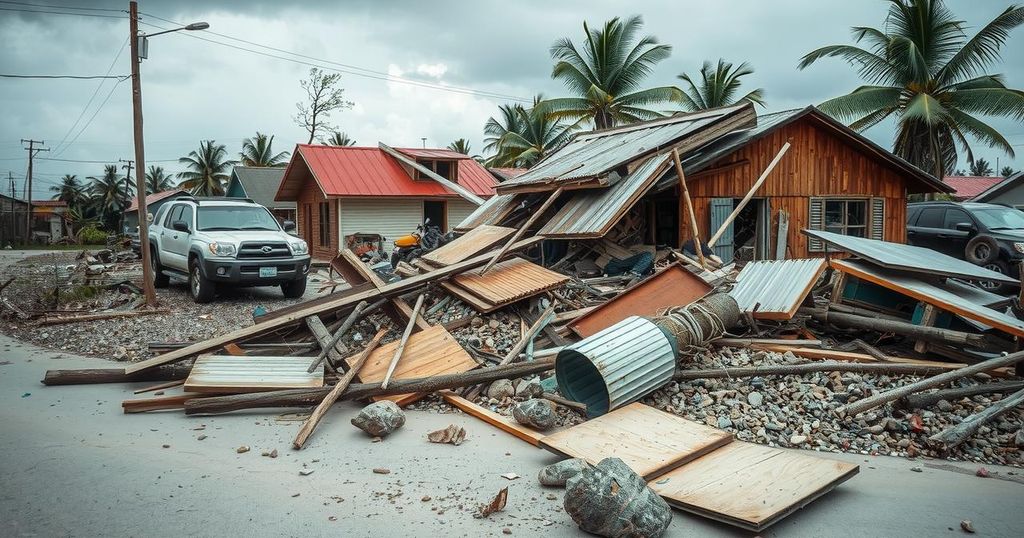Cyclone Chido Devastates Mozambique, Leading to 94 Deaths and Widespread Damage

Cyclone Chido has killed 94 individuals in Mozambique since December 15, injuring 768 and affecting over 622,000 people. The cyclone, which hit with winds of 260 km/h, severely impacted educational and health facilities, prompting the government to mobilize support for recovery efforts. The cyclone also caused fatalities and widespread damage in Mayotte before striking Mozambique.
Cyclone Chido has wrought devastation across Mozambique, resulting in the tragic loss of 94 lives since its landfall on December 15. Local authorities, including the National Institute of Risk and Disaster Management (INGD), report that the cyclone injured 768 individuals and affected over 622,000 people. The cyclone, which sustained winds of up to 260 km/h and delivered 250 mm of rainfall within the initial 24 hours, initially impacted Mayotte in the French Indian Ocean before advancing towards Mozambique, Malawi, and Zimbabwe.
In Mozambique, the cyclone particularly struck the northern provinces of Cabo Delgado, Niassa, and Nampula, which are frequently impacted by such natural disasters. Unfortunately, the storm has severely compromised educational and healthcare infrastructures; reports indicate over 109,793 students are affected, and 52 sanitary facilities sustained damage.
In response to the crisis, Daniel Chapo, the leader of Mozambique’s ruling party, emphasized the government’s commitment to mobilize support across various levels. During a visit to Cabo Delgado, Chapo expressed the administration’s determination to collaborate with the INGD in aiding recovery efforts in the hardest-hit regions, which include Mecúfi, Nampula, Memba, and Niassa.
Cyclone Chido also gained infamy in Mayotte, where it was recorded as the most devastating storm to strike in 90 years, leading to at least 35 fatalities. Authorities feasibly predict that the death toll may rise once comprehensive damage assessments are conducted. Local emergency services have deployed over 1,300 officers to support affected residents, though many still lack access to basic necessities like water.
Experts from the IPCC have indicated that human activity has significantly contributed to intensifying the effects of tropical cyclones, raising concerns over vulnerability to climate change. With the repercussions of Cyclone Chido illustrating the urgent need for resilient infrastructure planning, the INGD has called for a robust approach to mitigate the impacts of future natural disasters.
Overall, the devastation from Cyclone Chido underscores the critical importance of preparedness and effective response strategies to safeguard lives and restore stability in regions susceptible to recurring climatic events.
Cyclone Chido is a recent tropical cyclone that has significantly affected several nations in southeastern Africa and the Indian Ocean, beginning its destructive path in Mayotte, where it caused severe damage and fatalities. Following its impact in Mayotte, Chido continued its trajectory into Mozambique, Malawi, and Zimbabwe, causing further destruction and loss of life. Tropical cyclones, characterized by high wind speeds and intense precipitation, pose substantial threats to communities in vulnerable areas, particularly as climate change continues to exacerbate their severity and frequency.
In summary, Cyclone Chido has had a devastating impact in Mozambique, leading to significant loss of life and injuries, as well as disruption to essential services such as education and healthcare. As the government mobilizes resources for recovery, the cyclone serves as a stark reminder of the ongoing challenges posed by climate change and the urgent need for enhanced disaster preparedness and resilient infrastructures to protect vulnerable populations in the future.
Original Source: www.bbc.com








